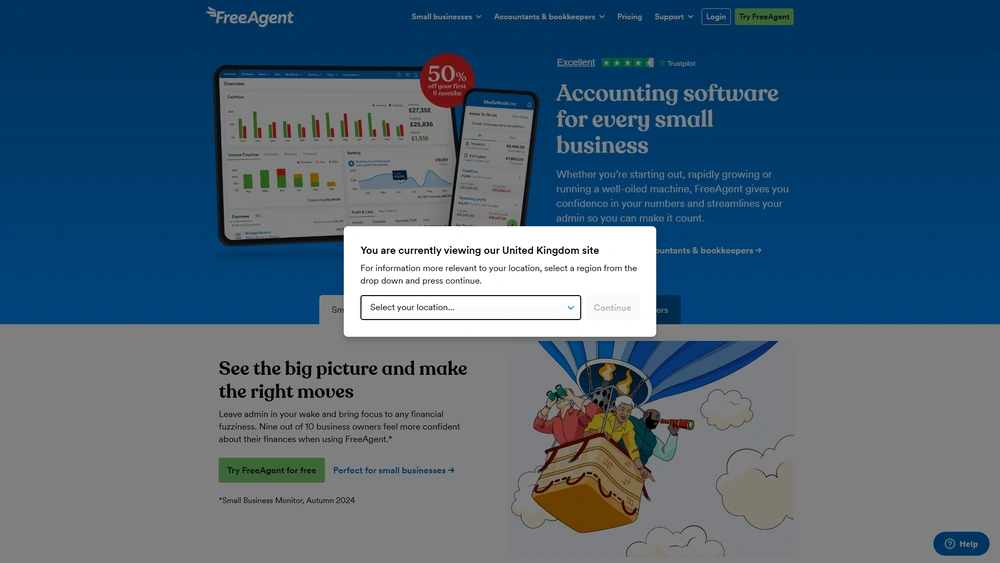FreeAgent Overview & 2026 Industry Position
FreeAgent is an accounting software platform built specifically for freelancers, small business owners, and micro-entity limited companies. Founded in the UK, it has gradually earned a reputation for offering a streamlined, automation-based alternative to complex accounting systems like Xero or QuickBooks. In 2026, FreeAgent users benefit from AI-assisted suggestions, compliance-ready tax filing, and robust Open Banking integrations—making the platform a timely solution for the growing gig economy and remote-first business culture. This year, FreeAgent positions itself as a digital-first financial ally for self-employed professionals seeking simplicity without sacrificing function.
From Launch to 2026: FreeAgent’s Journey
FreeAgent was launched in Edinburgh, Scotland in 2007 by freelancers keen to address the headaches of small-business accounting. Within five years, it expanded to support thousands of users, secured $1 million in funding (2011), and introduced automatic tax calculation (2013).
- 2007: FreeAgent launches to address freelancer accounting needs
- 2016: Debuts tax timeline feature—automating HMRC deadlines
- 2018: Acquired by RBS group—accelerating UK expansion
- 2021: Launches AI-powered invoice recognition
- 2023: Introduces direct bank feeds via Open Banking
- 2025: Expands to EU, integrates AI forecasting
The strategic focus for 2026 is clear: cement leadership in the UK/EU contractor and SMB markets by merging automation, AI, and effortless compliance in a single, intuitive stack.

FreeAgent Key Features
What makes FreeAgent stand out is its ability to cater directly to its niche: sole traders and small businesses that need comprehensive accounting without heavy lifting. Core offerings include:
- Automated Bookkeeping: Categorize and reconcile transactions seamlessly
- Self-Assessment Tax Estimates: Real-time progress tracking on taxes owed
- Time Tracking: Built-in timer and timesheet tools for project-based earnings
- Invoicing & Payments: Customizable invoice templates and online payments
- Cashflow and Profit Analytics: Visual financial dashboards
- Mobile App: Expense capture, mileage tracking, bank overview on-the-go
Workflow & UX
FreeAgent boasts a fluid, accessible user experience. The interface is built around dashboards and navigation tabs that group every essential feature—Contacts, Time Tracking, Invoicing, Banking, and Taxes—clearly. Transactions are auto-categorized, while tax calculation and deadlines are visually tracked via a color-coded timeline.
New onboarding offers contextual tips and built-in chat. The mobile experience has improved significantly, allowing quick receipt scans, mileage tracking, and invoice management on iOS and Android.
Pro Tip: Use the live tax timeline early in the year—it prevents surprises come filing time.
FreeAgent Pricing Analysis & Value Metrics
As of July 2026, FreeAgent has simplified its pricing to accommodate scalability while remaining affordable for solopreneurs:
| Plan | Monthly Pricing | Key Features |
|---|---|---|
| Sole Trader | $14/month | Self-assessment, invoicing, mileage, bank feed |
| Partnership/LLP | $16/month | Dual-partner tracking, capital accounts, invoicing |
| Limited Company | $18/month | VAT returns, RTI payroll, dividend planner |
Value Assessment: At under $20/month, FreeAgent delivers excellent ROI for small businesses avoiding accountant fees. Each tier is purpose-fit for the business structure, avoiding excess features or costs.
Competitive Landscape
FreeAgent’s key rivals across different segments include:
| Platform | Best For | Monthly Price | Core Difference |
|---|---|---|---|
| QuickBooks | Medium SMBs | $30+ | Heavier feature set; steeper learning |
| Xero | Multi-user teams | $25+ | Stronger integrations, less SME-focus |
| FreeAgent platform | Freelancers/Sole Traders | $14–$18 | All-in-one simplicity + tax support |
Use Cases
FreeAgent works especially well for:
- Freelancers and contractors billing hourly/project work
- Self-employed professionals tracking mileage and expenses
- Limited companies wanting RTI payroll and VAT filing
- Partnerships needing capital/share allocations
FreeAgent Integrations
The platform connects with many third-party tools essential for productivity. Key integrations include:
- Bank Feeds via Open Banking (Barclays, HSBC, Monzo, NatWest)
- PayPal, Stripe, and GoCardless for receiving payments
- HMRC for VAT and self-assessment submission
- Zapier support for automating repetitive tasks
Pros & Cons
- Pros:
- User-friendly interface for beginners
- Comprehensive UK tax support
- Mobile-friendly with auto mileage tracking
- Affordably priced for solopreneurs
- Cons:
- Limited customization vs. competitors
- Not ideal for large teams or high-volume ecommerce
- Limited U.S. compliance coverage
Final Thoughts
FreeAgent remains a top-tier choice for freelancers, contractors, and small service-based businesses in 2026. Its design makes accounting, tax compliance, and cashflow clarity accessible—without jargon or steep cost. For those prioritizing simplicity, automation, and mobile flexibility, FreeAgent software delivers on all fronts. It’s less suited to larger or inventory-heavy businesses, but unmatched in its space for the solopreneur economy.
FreeAgent FAQ
Not currently. FreeAgent primarily supports UK (and now EU) tax laws and HMRC filing. U.S.-based users might find limited compliance support.
Yes. FreeAgent supports VAT tracking and direct submission to HMRC, including Making Tax Digital (MTD) compliance.
Yes. For Limited Company plans, FreeAgent offers built-in RTI-compliant payroll filing for directors and employees.
Support is included via email and in-app messaging for all paid tiers. Phone support is not standard.
Yes. CSV uploads, bank statements, invoices, and contacts can be imported or migrated with support guidance.


